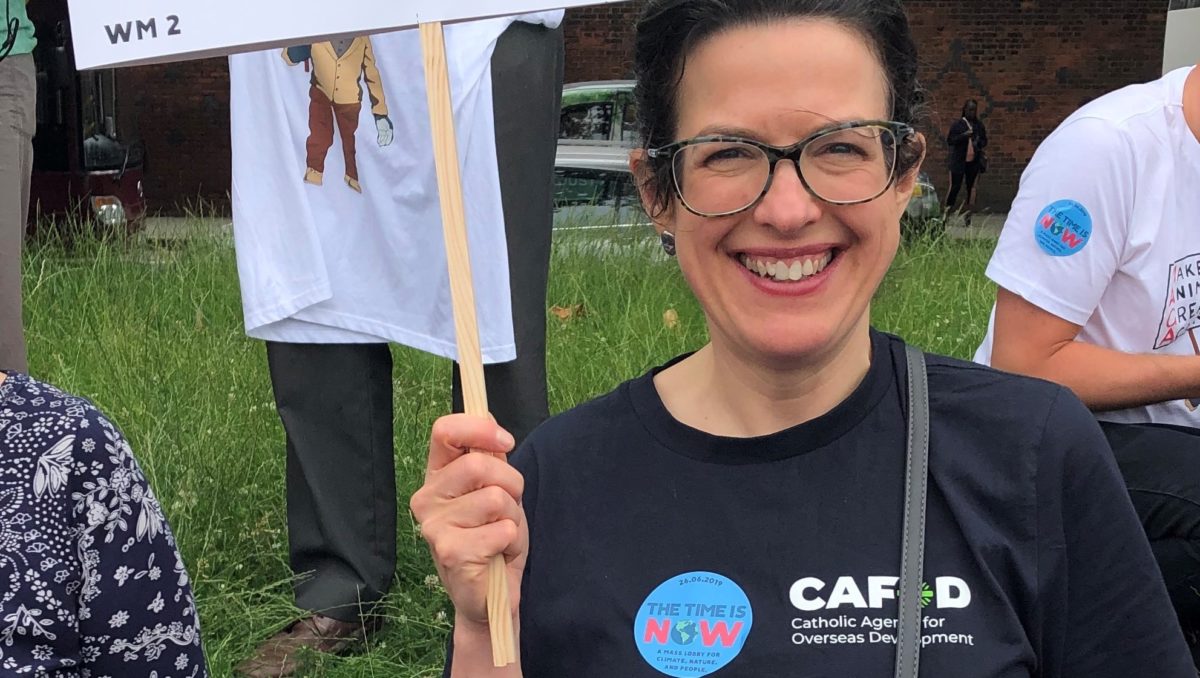How I’m showing solidarity during the coronavirus pandemic

Abigail McMillan, a parish volunteer at St Mary’s Parish in Harborne, explains what global solidarity means to her during the coronavirus pandemic.
Solidarity is a tricky concept to describe at the very best of times. This does not feel like the very best of times. Like many other CAFOD parish volunteers I am missing my church community. So far, we have only missed one CAFOD meeting in the parish though. It still feels strange to not be coming together to do something practical.
Instead I am reading a lot about what is happening around the world and I am missing my CAFOD friends.
Stopping the spread
As I am reading, I am interested to see that the methods to prevent the spread of a pandemic are of course the same, wherever and whoever we are.
Dr Dagoberto is part of CAFOD’s network of local experts working in Guarjerilo, El Savador. He says that his team is “explaining to people about preventive measures, the importance of quarantine and isolation, as well as carrying out rapid consultations for any patient that might have respiratory problems”.
Donate to CAFOD’s coronavirus appeal
Local networks share information
Not everyone is able to easily follow the guidelines of course. Monsignor Robert Vitillo is Secretary General of the International Catholic Migration Commission and warns “that many, many people… don’t always have access to good and factual information”.
Our local church networks are in 165 countries around the world as part of Caritas Internationalis. Local Caritas aid agencies are on the ground, reaching vulnerable communities with the information they need on hygiene and social-distancing via trusted faith and community leaders.
See how communities around the world are fighting coronavirus
Monsignor Vitillo reminds us that our duty, whether in the UK or anywhere else around the world, is “caring for those who are marginalised; about finding ways, even if they are remotely, to be sure that people are being taken care of, and that they have access to the basic necessities of life, especially when they are quarantined or when they need to voluntarily, or by the order of the governmental authorities”. We are equipping our local experts to respond to families in the greatest of need.
What can I do?
Meanwhile I am stuck here at home. I feel a bit powerless, but I have found comfort in the words of CAFOD partner José María Tojeira of the Institute of Human Rights at the University of Central America in El Salvador:
“In light of the drastic preventative health measures taken, which are the responsibility of the state, each individual should think critically and contribute by paying particular attention to our chief responsibility: following individual health guidelines.”
Now that I can do! By staying at home I am acting in solidarity, even if it does feel a bit passive.
Of course, that is not enough, as Tojeira explains:
“Reducing the loss of life and other health impacts of a pandemic threatening all is a core Christian responsibility. Overcoming fear, keeping our sights and consciences fixed on reality, and working together to carry out preventive measures and meet emerging needs are shared tasks. And for Christians, introspective, consecrated prayer is likewise a vehicle for solidarity.”
Discover tips on how to get online in your parish
If that is not a call to encourage my parish CAFOD group to become a virtual group, what is? And, as we gather as a group I know that my brothers and sisters around the world stand with me, as expressed by our friends in Caritas Jerusalem who recently contacted CAFOD’s Director to share, “Caritas Jerusalem’s solidarity with the people of the UK and with your wonderful team in CAFOD”.
I am comforted by their words: “We are deeply saddened by the number of people infected with the virus and we want to express our condolences, solidarity and prayers for all who are suffering and bereaved. At this time of sorrow, incomprehension and tragedy Caritas Jerusalem stands with the people of the UK, and in this crisis we pray for God’s mercy and healing for the sick and for health and strength for all who care for them.
These past few weeks have given me a chance to reflect on the meaning of solidarity. And to understand that I am strengthened by prayers from across the world as much as my prayers are strengthening others.